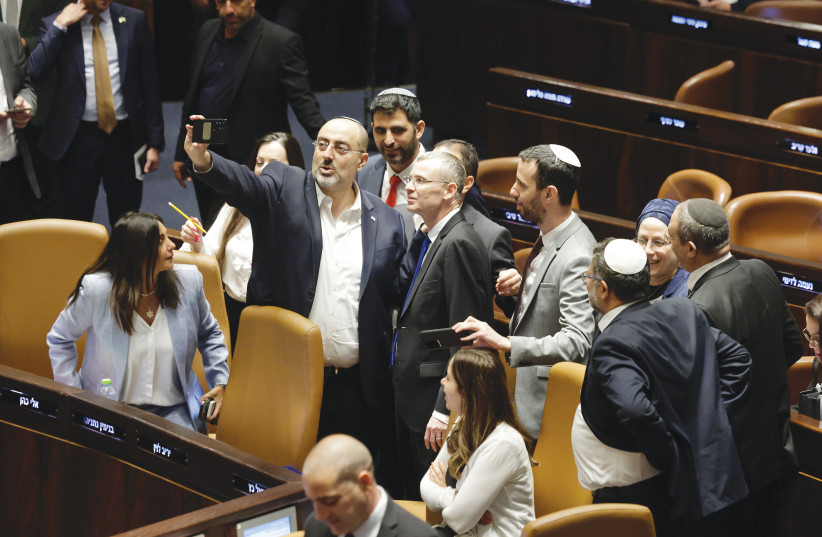Agriculture Minister Avi Dichter (Likud) called for "the sane on both sides" of the debate surrounding the government's judicial reform plan to oppose the "zealots on each side" in a Facebook post on Friday morning.
Dichter referenced the story of the destruction of the Second Temple, in which the Zealots torched storehouses containing 20 years worth of food in the besieged city of Jerusalem in order to force the populace to fight the Romans.
"Contrary to such and other voices, I am not ignoring the difficult rift we are going through. The quarrel crosses between us, the discord divides. Each side blames the other side, just like then, in the days before the destruction of the Second Temple."
"It is absolutely clear that the 'zealots' who burn the food storehouses, and who must be restrained in every way - work and operate with their own rules and not in the interest of the people and the state," wrote Dichter. "'Zealots' do not have to have the strength of the masses, they use massive strength: physical strength, financial strength, economic strength, and business strength. Yes, they also activate human centers of power that are beyond their control, without really understanding it."
"Just like on Yom Kippur of 1973 (the date of the Yom Kippur War), 'zealots' of a conception, greatly endangered the country from a security and military aspect, thus today, there are 'zealots' who endanger the country by dragging them into extreme legislation, or by drifting into extreme and violent protest," continued Dichter in an apparent reference to both some of the proponents of the government's judicial reform and parts of the protests against it.

The minister stressed that he didn't believe the Yom Kippur War would spell the end of the state and he doesn't believe that the current situation will either.
"I do see before me the challenge that we can face and overcome. The sane on both sides, who are the overwhelming majority, against the 'zealots' on each side, who are the minority that wants to blow things up. We will do it with a lot of wisdom and a lot of heart, and especially with more wisdom in the heart - together we will overcome!"
Aliyah minister says judicial reform may need to be frozen in order to create calm
Dichter wasn't the only one to call for politicians to show restraint on Friday.
In an interview with KAN Reshet Bet radio, Aliyah and Integration Minister Ofir Sofer (Religious Zionist) stated that it may be necessary to "freeze" the judicial reform in order to "calm the situation, build trust, and strengthen solidarity," on Friday.
"I feel that it's gotten to a place where we need to make a great effort to ensure that this period does not enter the history books and this is our responsibility. Our responsibility is to calm things, I said before we need to pull the emergency brake to stop and calm and this responsibility is first of all on us, the government."
Sofer stated that the government is committed to using the next four months to hold a discussion and listen to the debate surrounding the judicial reform.
"I'm not sure if what I'm saying is popular among all my constituents but I'm saying it because I believe it," said Sofer to KAN Reshet Bet. "I think our national responsibility obligates us to calm things, to try and advance the legislation, if at all, then as much as possible through cooperation. It could be that we need to freeze [the reform] for a certain period. I think that right now the central mission is to strengthen solidarity, to calm the situation, to build trust."
The minister explained that the government advanced the reasonableness standard law because they "felt a need to do something small," adding that it was possible to reach an agreement on the law and that the attempts to reach an agreement had fallen on small things such as whether or not the opposition should vote in support of the bill or just abstain.
Sofer stated that some recent statements made and bills submitted by some members of the coalition were attempts to "catch headlines," and stressed that "we need to act responsibly. Whoever desires the stability of the government needs to talk less and do more, and when they do talk to talk about connecting and unity even if they're not sure that's what their electorate wants to hear."
